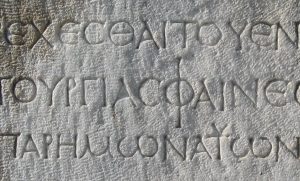Instructor 
- Andrew Wolpert, Ph.D., Associate Professor of Classics
- Email and Office Phone: wolpert@ufl.edu, 352-273-3702
- Office Hours: Monday, Wednesday, and Friday Period 4 and by appointment
- Office: 138 Dauer Hall
Course Format
- Meetings: Monday, Wednesday, and Friday in 125 Dauer Hall
- Online Drills: On Thursday, students complete an online drill in Canvas that is intended to help them review morphology and vocabulary
Class Description and Objectives
GRE 1120 is the first half of the beginning ancient Greek sequence. Students will learn the basic vocabulary, morphology, grammar, and syntax of ancient Greek, and they will read adapted passages from ancient Greek authors. Upon completion of GRE 1120 and 1121, students will be able to identify, explain, and analyze the basic elements of ancient Greek and read ancient Greek authors at the intermediate level.
Required Texts
- Cynthia W. Shelmerdine, Introduction to Greek, 2nd Edition (Newbury, MA: Focus Publishing, 2008). ISBN: 1585101842. Students are required to purchase the second edition.
Course Requirements
- Attendance (10%). Attendance will be taken at class meetings. There will be a 25% deduction for arriving late, leaving early, or being unprepared for class.
- Homework (10%), the lowest score is dropped. Please consult the course’s Canvas page for the daily homework assignments.
- Weekly Online Drills (10%), the lowest score is dropped.
- Tests (70%): Test 1 (200 points) on Friday, February 1; Test 2 (250 points) on Friday, March 15; and Test 3 (250 points) on Wednesday, April 24.
Weekly Schedule*
- Jan 7-11: Introduction and Chapter 1
- Jan 14-18: Chapters 2-3
- Jan 22-25: Chapters 4-5
- Jan 28-Feb 1: Chapter 5 and Test 1
- Feb 4-8: Chapters 6-7
- Feb 11-15: Chapters 8-9
- Feb 18-22: Chapters 9-10
- Feb 25-March 1: Chapters 10-11
- March 11-15: Chapter 11 and Test 2
- March 18-22: Chapters 12-13
- March 25-29: Chapters 13-14
- April 1-5: Chapters 14-15
- April 8-12: Chapters 15-16
- April 15-19: Chapters 17-18
- April 22-24: Chapter 18 and Test 3
*For the daily assignments, please consult the course’s Canvas page.
Grading Scale*
A = 93–100%
A- = 90–92%
B+ = 87–89%
B = 83–86%
B- = 80–82%
C+ = 77–79%
C = 73–76%
C- = 70–72%
D+ = 67–69%
D = 63–65%
D- = 60–62%
E < 59%
*Grades are rounded to the nearest whole number (e.g., 89.4% = 89% and 89.5% = 90%)
Course Policies
- Academic Honesty: UF students are bound by The Honor Pledge which states, “We, the members of the University of Florida community, pledge to hold ourselves and our peers to the highest standards of honor and integrity by abiding by the Honor Code. On all work submitted for credit by students at the University of Florida, the following pledge is either required or implied: ‘On my honor, I have neither given nor received unauthorized aid in doing this assignment’.” The Honor Code specifies a number of behaviors that are in violation of this code and the possible sanctions. Furthermore, you are obligated to report any condition that facilitates academic misconduct to appropriate personnel. If you have any questions or concerns, please consult with the instructor of this class.
- Students with Disabilities: Please do not hesitate to ask for accommodation for a documented disability. Students requesting classroom accommodation must first register with the Dean of Students Office (disability.ufl.edu). The Dean of Students Office will provide documentation to the student, who must then provide this documentation to the Instructor when requesting accommodation. Please ask the instructor if you would like any assistance in this process.
- Attendance and Make-up Policy: Requirements for class attendance and make-up exams, assignments, and other work in this course are consistent with university policies: https://catalog.ufl.edu/ugrad/current/regulations/info/attendance.aspx
- Course Evaluation: Students are expected to provide feedback on the quality of instruction in this course by completing online evaluations at evaluations.ufl.edu. Evaluations are typically open during the last two or three weeks of the semester, but students will be given specific times when they are open. Summary results of these assessments are available to students at https://evaluations.ufl.edu/results/.
Counseling Resources
Students experiencing either health or personal problems that interfere with their general well-being are encouraged to seek assistance through the university’s health care and counseling centers. Resources are also available on campus for students who wish to explore their career options.
- Student Health Care Center, 392-1161, http://shcc.ufl.edu/
- University Counseling and Wellness Center, 3190 Radio Road, 392-1575, https://counseling.ufl.edu/
- UMatter We Care, 294-care, umatter.ufl.edu
- Career Connections Center, Suite 1300, J. Wayne Reitz Union, 392-1602, www.crc.ufl.edu/